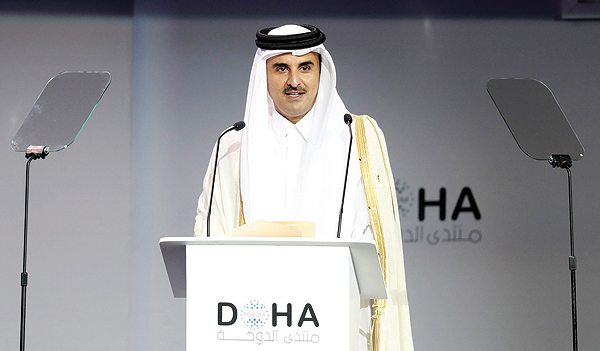

DOHA: Qatari Foreign Minister Sheikh Mohammed bin Abdulrahman Al-Thani yesterday said his country is counting on Kuwait's role in resolving the Gulf crisis. "We still believe that dialogue can restore the relationship under the sovereignty of countries," he said during a debate following the opening of the 2018 Doha Forum. "We continue to rely heavily on the role of Kuwait and the role of other countries in the region to overcome the crisis," he added.
Sheikh Mohammed said that the boycott imposed on the emirate by Saudi Arabia and its allies had irreparably damaged the existing six-nation Gulf Cooperation Council set up at the height of the Iran-Iraq war in 1981. "The regional alliance has been undermined by the crisis," he told policymakers at the two-day forum. "Therefore the alliance that existed needs to be reshaped and redesigned to ensure future stability and security of the region."
The minister said the GCC had "no teeth" to resolve any dispute. "They have mechanisms in place and never trigger them because some countries believe they are non-binding." He said that despite the failings of the GCC, he still expected a regional solution. Kuwait has been leading diplomatic efforts but has so far been unable to resolve the crisis. Sheikh Mohammed lashed out at the reasons advanced by Saudi Arabia and its allies Bahrain and the United Arab Emirates for imposing their sweeping boycott. "It was based on lies, it was based on crimes… it was based on creating propaganda to create fear among the people," he said.
Riyadh and its allies accused Doha of supporting "terrorist groups", including the Muslim Brotherhood which they blacklist but with which Qatar has longstanding ties. They also accused the emirate of advocating improved relations with Saudi archrival Iran, with which Qatar shares important offshore gas fields. They set out their complaints in a 13-point list of demands that has been rejected by Doha as an assault on its sovereignty and its right to conduct an independent foreign policy.
In his opening remarks to the forum, Qatari Amir Sheikh Tamim bin Hamad Al-Thani said Qatar's Gulf partners needed to show respect for the country's independence. "Our position has not changed on how to solve the Gulf crisis," the Qatari leader said. "This can be achieved by lifting the siege and resolving differences through dialogue and non-interference in other countries' internal affairs."
Sheikh Tamim noted that his country believed in the importance of the need for dialogue and is keen to keep the platforms of dialogue and platforms of communication open to exchange views in a free environment for all intellectual affiliations and political views. He pointed out the crises and challenges in the region, including the Palestinian issue, the Arab-Israeli conflict, the Iraq war and "the Arab uprisings, which were universally referred to as the Arab Spring", as well as the problems of migration, unemployment and security.
A number of decision-makers and politicians around the world, heads of state and government, representatives of the private sector, civil society and non-governmental organizations are attending the two-day forum. Kuwait is participating in the forum with a delegation headed by Finance Minister Nayef Al-Hajraf and Kuwaiti Ambassador to Qatar Hafeeth Al-Ajmi.
Foreign ministers from Iran and Turkey, which both supported Qatar in the row, are also attending the two-day forum. Romania's foreign minister, Teodor-Viorel Melescanu, told the gathering that the European Union is working on organizing a conference that could help solve the Gulf rift. "We are thinking about a joint event for the EU and Arab countries and we would like to have a direct discussion with the GCC countries. We hope to hold it in April and in principle it would take place in Bucharest," he later told Reuters. Romania takes the rotating presidency of the Council of the EU from January for the next six months.
Bahrain's foreign minister said yesterday there was no need for mediation as the solution lay in Doha's hands. "It is not our crisis, it is Qatar's crisis. So there is no need for a mediator to solve it, what it needs is for a wise person from its (Qatar's) people," Sheikh Khalid bin Ahmed Al-Khalifa tweeted.

